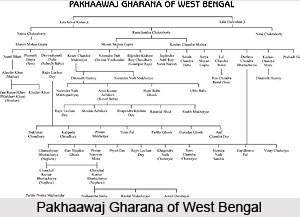 Hindustani Classical Music or North Indian Classical Music has always undergone steady growth but at times it has also suffered a setback and stagnation over the last few hundred years. Majority of the Muslim rulers were disinclined towards music as it was stated in their religion. However a few of these emperors became great lovers of Indian music and art. Hence they encouraged the development of music and welcomed many great musicians in their courts from their native lands. Among these famous singers was Amir Khusrao. He is considered as the most notable musician and is credited with assimilating the Iranian mquam with Indian Raaga and then creating new raaga from this union.
Hindustani Classical Music or North Indian Classical Music has always undergone steady growth but at times it has also suffered a setback and stagnation over the last few hundred years. Majority of the Muslim rulers were disinclined towards music as it was stated in their religion. However a few of these emperors became great lovers of Indian music and art. Hence they encouraged the development of music and welcomed many great musicians in their courts from their native lands. Among these famous singers was Amir Khusrao. He is considered as the most notable musician and is credited with assimilating the Iranian mquam with Indian Raaga and then creating new raaga from this union.The import of talented musicians from outside India has had a positive influence on raaga music in the Hinduism music tradition. Emphasis was placed on the aesthetic element of the Raaga structure. Rendering of Raaga became much more submersed with human emotions that were initially designed. The original raaga music still retained the ancient essence and its good old qualities. This made Hindustani music more active, making it an important art in the royal courts. Unfortunately being in a superior position in the courts and enjoying the fruits of the highest patronage from the kings, musicians became confident, idle and somewhat vain. Music faced a setback. From a strange combination of strength of the dynamism and weakness of the setback evolved what came to be known as the Gharana System.
Gharana in the musical terms came to represent a particular tradition or a particular way of presenting Hindustani music. It is interesting to trace the history of the concept of Gharana. Gharaha gained importance after the 16th century. King Akbars court proved to the most supportive to the propagation and flourishing of the Hindustani music, but his successors did not prove to be so. Therefore gifted musicians left their courts one by one and went all over North India looking for patronage from other courts and states.
 Once taken the rulers were averse to the musicians to go anywhere else. They were isolated from their people completely and forced to live in some kind of musical confinement. Naturally there remained no scope for these musicians to widen their musical knowledge or musical vision. Continued isolation produced rigid adherence to one?s style creating almost an obsession. From these arose strict musical lineages that were zealously guarded and preserved. Master of that lineage assumed the leadership of the followers of that musical lineage. Since the ?father? and the entire lineage was confined to one geographic area, their musical lineage, called ?Gharana? came to be known after the name of that place and their musical style itself as the style of that Gharana. The names of different Gaharana assumed the names of the villages and towns in North India.
Once taken the rulers were averse to the musicians to go anywhere else. They were isolated from their people completely and forced to live in some kind of musical confinement. Naturally there remained no scope for these musicians to widen their musical knowledge or musical vision. Continued isolation produced rigid adherence to one?s style creating almost an obsession. From these arose strict musical lineages that were zealously guarded and preserved. Master of that lineage assumed the leadership of the followers of that musical lineage. Since the ?father? and the entire lineage was confined to one geographic area, their musical lineage, called ?Gharana? came to be known after the name of that place and their musical style itself as the style of that Gharana. The names of different Gaharana assumed the names of the villages and towns in North India.For more, visit the link below: